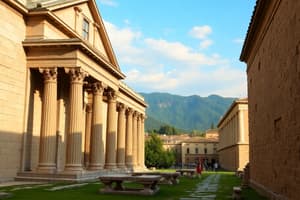Podcast
Questions and Answers
What key feature differentiated early civilizations from earlier societies?
What key feature differentiated early civilizations from earlier societies?
- Establishment of organized government (correct)
- Use of fire for cooking
- Ritualistic practices
- Nomadic lifestyle
Which of the following early civilizations is associated with the Tigris-Euphrates river valley?
Which of the following early civilizations is associated with the Tigris-Euphrates river valley?
- Egyptian Civilization
- Mesopotamian Civilization (correct)
- Indus Valley Civilization
- Shang Civilization
Which ancient Greek city-state is known for its military prowess?
Which ancient Greek city-state is known for its military prowess?
- Thebes
- Corinth
- Sparta (correct)
- Athens
What was a primary characteristic of feudalism during the Medieval Period?
What was a primary characteristic of feudalism during the Medieval Period?
Which figure is primarily associated with the Reformation?
Which figure is primarily associated with the Reformation?
What was a major belief promoted during the Enlightenment?
What was a major belief promoted during the Enlightenment?
What was a significant result of the Industrial Revolution?
What was a significant result of the Industrial Revolution?
Which statement best describes the impact of globalization in contemporary history?
Which statement best describes the impact of globalization in contemporary history?
Flashcards
Early Civilizations
Early Civilizations
Ancient societies that developed in river valleys, characterized by organized government, complex social structures, and advancements in agriculture and technology.
Ancient Greece
Ancient Greece
A civilization that flourished in the Mediterranean, known for its city-states, philosophy (Socrates, Plato, Aristotle), democracy, art, and literature.
Ancient Rome
Ancient Rome
A powerful empire that controlled the Mediterranean, known for its law, engineering, architecture, and lasting influence on later civilizations.
Medieval Period
Medieval Period
Signup and view all the flashcards
Renaissance
Renaissance
Signup and view all the flashcards
Reformation
Reformation
Signup and view all the flashcards
Industrial Revolution
Industrial Revolution
Signup and view all the flashcards
World Wars
World Wars
Signup and view all the flashcards
Study Notes
Early Civilizations
- History encompasses the study of humanity's past, encompassing cultures, societies, and events.
- Early civilizations emerged in river valleys like the Nile, Tigris-Euphrates, Indus, and Yellow River, where fertile land supported agriculture.
- Key features of early civilizations included organized government, complex social structures, writing systems, and advancements in agriculture and technology.
- Examples include the Mesopotamian, Egyptian, Indus Valley, and Shang civilizations.
Ancient Greece and Rome
- Ancient Greece, characterized by city-states like Athens and Sparta, made significant contributions to philosophy, democracy, art, and literature.
- Key figures include Socrates, Plato, and Aristotle.
- Ancient Rome, initially developing as a republic, transitioned into an empire dominating much of the Mediterranean world.
- Roman law, engineering, architecture, and language had lasting impacts on subsequent civilizations.
Medieval Period
- The Medieval Period, spanning roughly from the 5th to the 15th centuries, was marked by feudalism, the rise of Christianity, and the Crusades.
- Feudalism was a social and economic system based on land ownership and obligations.
- The Church held significant power and influence during this time.
- The Crusades were a series of religious wars between Christians and Muslims.
Renaissance and Reformation
- The Renaissance, a period of renewed interest in classical learning and art, flourished in Europe.
- Key figures such as Leonardo da Vinci and Michelangelo made significant contributions in the arts, science, and literature.
- The Reformation was a religious movement challenging the authority of the Catholic Church.
- Key figure: Martin Luther.
17th to 18th Centuries
- 17th and 18th centuries saw the rise of scientific revolution and Enlightenment ideals.
- The Scientific Revolution challenged traditional views of the universe.
- The Enlightenment promoted reason, individual rights, and liberty.
19th and 20th Centuries
- The 19th and 20th centuries were characterized by industrialization, political revolutions, and global conflicts.
- The Industrial Revolution led to significant technological advancements and social changes.
- World Wars I and II were major global conflicts with far-reaching consequences.
Contemporary History
- Contemporary history covers recent events, often including the rise of global interconnectedness and the impact of technology and globalization.
- Issues such as political ideologies, economic systems, social movements, and environmental challenges are significant considerations.
- Modern political, social, and economic trends of the world continue today.
Studying That Suits You
Use AI to generate personalized quizzes and flashcards to suit your learning preferences.




